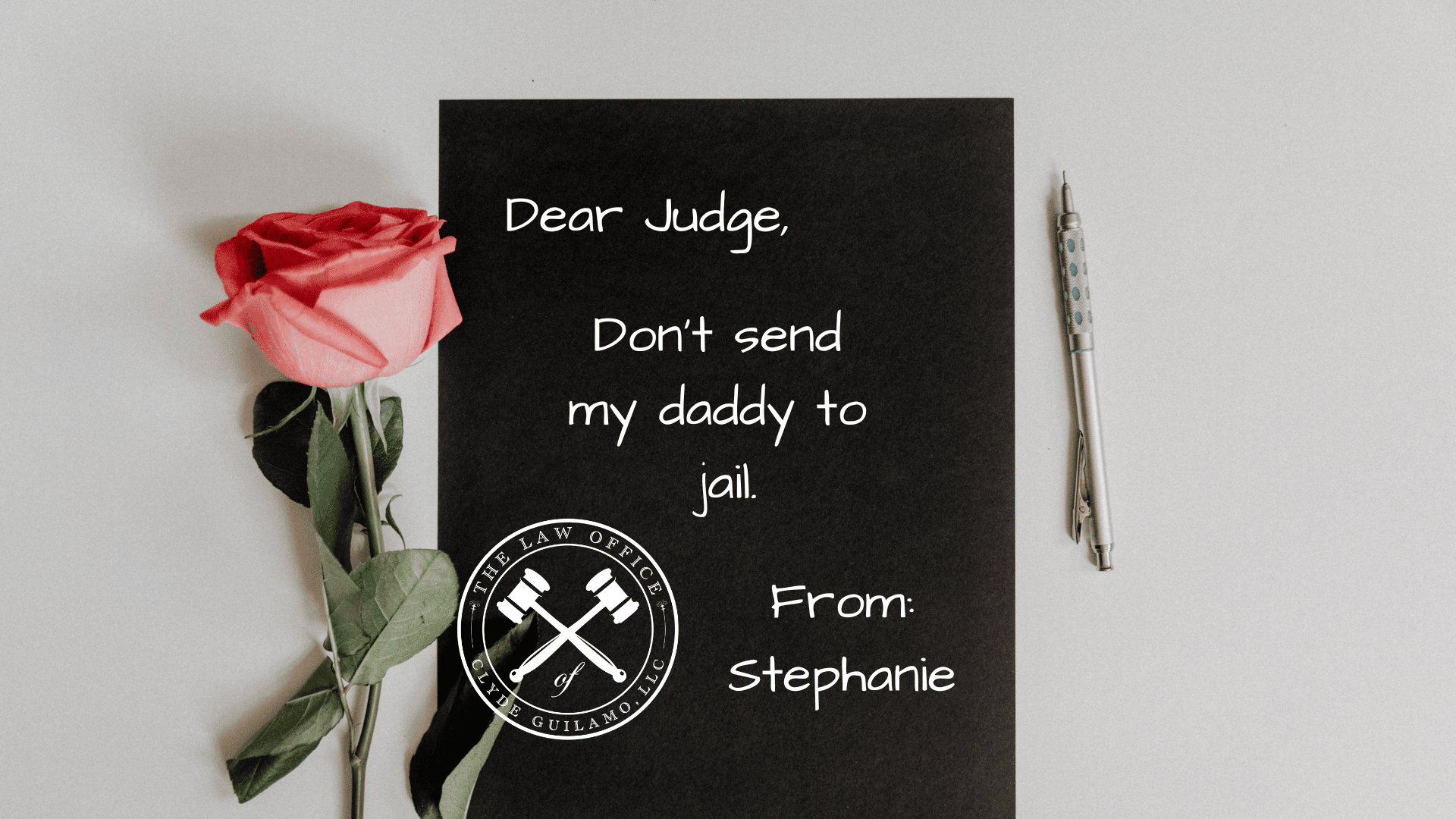
Everything You Need to Know About Character Letters in Criminal Cases
Criminal Defense Lawyer Serving Cook, DuPage, DeKalb, Grundy, Kane, Kankakee, Kendall, LaSalle, Lee, Ogle, and Will Counties
If you have been charged with violating the law, then your lawyer may ask you for “character letters” (sometimes called “mitigation letters”). It does not matter if your pending case is a felony, misdemeanor, or petty offense because character letters are a common item in any mitigation packet. In this article, Criminal Defense Attorney Clyde Guilamo explains everything you need to know about character letters in criminal cases. By the end, you’ll be able to competently write or request one. And if you are still looking for a lawyer, call Attorney Clyde Guilamo today for a free consultation.
Table of Contents

What is a Character Letter?
At the beginning of any criminal case, the prosecutor and the judge have virtually no idea who you are, and what you have been up to. Unfortunately, the only things that prosecutors have in front of them are your criminal history and the police reports of this incident. Instead of being just another file, we want to educate the judge and prosecutor about who you are a person! One item that can often be helpful is a character letter.
Character letters are letters that describe the defendant’s character and are often written by supervisors, teachers, relatives, counselors, and others who know the defendant in criminal cases. During sentencing, a judge may limit the number of live witnesses to testify as to a defendant’s character but usually would accept an unlimited number of letters.
Because character letters can have a direct impact on the outcome of a case, criminal defense attorney Clyde Guilamo put together this guide to help your references write an effective and well-written character letter.
What should my references write about in a character letter?
In a character letter, your references can write about any topic that would serve as mitigation. Those topics include your:
- Engagement or completion of a treatment program (i.e., drug, anger management, parenting);
- Employment that serves the community (i.e., teachers, police officers, firefighters);
- Lack of Criminal History;
- Coaching of a sport’s team (i.e., a team photo, a clip out of a local paper, a website);
- Mentoring a child (i.e., Big Brothers/Big Sisters, YMCA, MindsMatter);
- Medical condition;
- Compliance with all pre-trial conditions;
- Intellectual disability, or serious mental illness;
- Passed abuse which explains your current charges;
- Involvement in a church (i.e., deacon, parking attendant, Sunday school teacher);
- Community Service or Volunteer work (i.e., soup kitchen, street cleaning, shelters);
- Acknowledgment of wrongdoing, and/or making the victim whole (i.e., apology letters, paying the victim’s medical expenses, paying restitution);
- Caregiving, especially for someone with a disability (i.e., cancer-patient, elderly parent, young children; relatives with down syndrome);
- Enrollment in school (i.e., College, Nursing Program, Trade School);
- Donations to a 501(c)(3) org. (i.e., Red Cross, March of Dimes);
- Proof of Fulltime Employment (i.e., paystubs, badges, and/or I.D.’s);
Please understand, this is not a complete list. You should contact your lawyer to see if talking about another subject would be proper in a character letter.
What is the goal of character letters?
The goal of providing a character letter is to get a good outcome in your criminal case. The 4 reasons to provide a character letter are to:
- Receive a sentence in the lower end of a sentencing range;
- Get a reduction of the charges in the case;
- Get admitted into a deferred prosecution or special probation program; or
- Get a dismissal of one or more charges in the case.
Let me explain each one of those goals in turn.
Low Sentence Within Sentencing Range
Generally, all crimes have a sentencing range. For example, in many circumstances domestic battery is a class A misdemeanor in Illinois. Thus, that crime has a sentencing range of up to a year in the county jail. A sentence of jail, however, is not mandatory. Another possible sentence is probation. Your lawyer might provide a character letter to the prosecutor to reach a plea agreement of 18 months of probation.
Reduction of the Charges
Many crimes can become a higher-class felony that carry harsher penalties if certain conditions apply. For example, retail theft is generally a misdemeanor, but can be a felony if the item that you stole was worth more than $300. Your lawyer may present a character letter to the prosecutor from a drug treatment counselor explaining the progress you have made in your sobriety. The prosecutor may reduce the charge from a felony retail theft to a misdemeanor retail theft because you provided this character letter.
Admission into a Deferred Prosecution or Special Probation
In Illinois, you must receive the approval of the State’s Attorney to receive the outcome of second chance probation. This form of probation is great because if you successfully complete the program, your case will be dismissed. That means that you would be able to expunge the case from your criminal record! You would also need the approval of the prosecutor to enter a deferred prosecution program. A defense attorney should present character letters to the prosecutor so that he or she would agree to your admission into the appropriate program.
Dismissal of one or more charges
If you are charged with domestic battery and regular battery, you should know that domestic battery is ineligible for court supervision. While the case is pending, the victim may write a character letter specifically informing the prosecutor that he or she does not want you to have a conviction because of the impact it will have on your employment and the support for the family. This character letter can be very persuasive in causing a dismissal on the domestic battery charge, and supervision with domestic violence classes on the regular battery charge.
When should you provide character letters?
There are two stages in any criminal case where character letters are important: 1) during plea negotiations with the State, and 2) at the time of sentencing. Since plea negotiations may happen early on, you should get character letters over to your attorney as soon as possible. Let’s discuss their role in plea negotiations, and then discuss their role in sentencing.
Plea Negotiations
In many criminal cases, a prosecutor makes a “plea offer” to the defendant. Stated differently, the prosecutor agrees to recommend a specific sentence if the defendant agrees to plead guilty. Since crimes can have a large sentencing range, many defendants choose the known outcome offered by the State instead of the unknown outcome if left to the judge. During plea negotiations the prosecutor can agree to:
- A sentence in the lower end of a sentencing range;
- A reduction of the charges in the case;
- Admission of the defendant into a deferred prosecution or special probation program; or
- A dismissal of one or more charges in the case.
Since there are so many things a prosecutor can do, defense attorneys usually provide character letters and request a specific outcome. Requesting a specific outcome is usually called a “counteroffer.”
Sentencing
In Illinois, there are two times in any criminal case where the judge can consider the sentence that the defendant can get: 1) During a 402 conference; and 2) at a sentencing hearing.
A 402 conference is a pre-trial conference with the judge in which the judge is made aware of the pending plea negotiations between the defendant and the prosecutor. Essentially, the judge serves as a mediator in the discussion and can recommend a specific sentence. Your lawyer should have all the mitigation materials (like character letters) ready for the judge before he or she enters the 402 conference.
If the judge or jury finds you guilty, then the case will be continued for a sentencing hearing. At the sentencing hearing, your lawyer should provide character letters to the judge so that you can either 1) receive a sentence on the low end of the eligible sentencing range; or 2) admit you into a specialized program.
Plea Negotiations vs. Sentencing
This is a good time to explain powers that only the prosecutor has. Only the prosecutor can:
- Reduce a charge; and
- Dismiss a charge.
In a 402 conference, a judge cannot reduce an armed robbery to a robbery, or a residential burglary to a burglary. The power to offer a reduced charge resides with the prosecutor.
Also, the judge cannot dismiss a charge in a 402 conference. If you only want to plead to one charge and not the other, that is not something that the judge can recommend in a 402 conference. Thus, if your goal is to reduce or dismiss a charge, then your lawyer must present your character letters to the prosecutor in plea discussions.
4 Tips for writing a Great Character Letter (Mitigation Letter)
- Type it. You might want to give your letter a personal touch by handwriting it. The stakes, however, are too high for you to risk the judge not being able to read your handwriting. Even if you have excellent penmanship, make it easy for the judge to read by just typing it. You can use your excellent handwriting when it is time to sign the letter.
- Start by explaining who you are and your relationship to the defendant. So your lawyer has just handed a character letter to the judge. The first questions that the judge will have are “who wrote this” and “how do they know the defendant.” Your character letter should very clearly answer these questions early on to establish your credibility on your opinion of the defendant’s character.
- Tell a story! A story that explains a characteristic is much better than your opinion of that defendant has that characteristic. Here are some examples to illustrate this point:
- Bad – The defendant is trustworthy.
- Good: The defendant was solely responsible for opening and closing our store for the last 3 years and not once did we have an issue with missing funds or products.
- Bad – The defendant is hardworking.
- Good: We track productivity in our store and defendant has consistently outperformed all other employees in the last 6-month cycle.
- Bad – The defendant is a good dad.
- Good: When our daughter was born, defendant watch YouTube videos to learn how to do our daughter’s hair. Today, he is the one who does her hair every morning for school.
- The Ask. It is perfectly fine to write a character letter about the defendant without requesting a specific outcome on the case. In fact, great character letters can have no requests in them at all. (Below, I have multiple examples of letters where no specific outcome is requested). But if you are going to ask for something specific, make sure it is something that the judge can do. For example, asking for court supervision on a felony with a mandatory prison sentence is not an effective ask because the judge cannot legally grant that request.
3 Problems to Avoid in Character Letters
- Blaming the Victim. There is almost no circumstance in which the victim’s name should ever appear in the character letter. You may feel that the victim contributed to the crime, but please, fight the temptation to “bring the victim’s fault” to the judge’s attention. If you say anything about the victim, your character letter may have the opposite effect of upsetting the judge.
- Minimizing the Crime. Character letters are often written by people who are not witnesses to the crime. As a result, you should not comment on the evidence or crime. If you write in the letter that the defendant should not have been found guilty, or that the crime was not that serious, your letter may once again may have the opposite effect of upsetting the judge.
- Attacking the Criminal Justice System. The judge may have made a mistake in this case. The prosecutor may be over-reaching in this case. The police may have made many errors in the investigation of this case. There may be disproportionate treatment of certain groups of people in the charged offense. Now is not the time to mention any of that stuff.
3 Templates for Writing a Character Letter
| 1. Pastor Character Letter Template: Victor Jones Pastor at Holy Ghost Church 123 Main Street, Aurora, IL, 60503 708-867-5309 pastorvicjones@gmail.com To Whom It May Concern: My name is Victor Jones, and I am the lead pastor at Holy Ghost Church. (Name of Defendant) has been a member of our parish for 8 years and regularly attends Sunday mass. About 8 months ago, (name of defendant)’s issues with alcohol began after the death of his wife. At the church, we saw how the death weighed on him because he became the single father of two daughters. I noticed that he started missing Sunday services, and he would routinely ask for prayers because of the stressors in his life. This DUI happened when he was in a very dark place. In June, (name of defendant) began attending the Alcoholics Anonymous classes at our church, and we have seen the rebirth of our brother-in-Christ. (Name of Defendant) has since led a grief small group at our church and volunteers as a parking lot attendant. His daughters attend church every Sunday and are part of youth choir. Thank you for taking the time to read this letter. The number above is my personal cell phone number, and I can be contacted if you have any questions. Sincerely, Signature |
| 2. Employer/Supervisor Character Letter Template: Roberto Alvarez Garden of Eden Lawn Care 123 Heavenly Street, Chicago, IL, 60611 708-867-5309 rob.alvarez@gardenofeden.com To Whom It May Concern: My name is Roberto Alvarez, and I am the owner of Garden of Eden Lawn Care. We are a lawn maintenance company that services over 800 homes on Chicago’s south side. (Name of defendant) has been an employee for 4 years. About two years ago, (name of defendant) came up with an idea that has completely made us the top lawn care company on the Chicago south side. His idea was for every acre of lawn we get paid to mow, we mow the same amount for a non-for-profit or vacant lot. At first, I thought this idea would bankrupt us because of the time and costs associated with mowing all that lawn for free. The exact opposite happened! When the news found out that we were doing this, they ran a segment on primetime television which tripled the number of people who wanted us to handle their lawncare. Today, we service 80 churches, 200 vacant lots, and 15 public schools. Currently, (name of defendant) is a partial owner of our business, and he oversees the free lawncare division for non-for-profits and vacant lots. When our guys call in sick, he jumps onto a truck and personally mows that day’s properties. (Name of defendant) is a good man, and I without reservation write this character letter. If I can be of any more service, please do not hesitate to ask me. Sincerely, Signature |
| 3. Family Member Character Letter Template: Stacy Song Sister of Defendant 123 Court Street, Kankakee, IL, 60901 708-867-5309 ssongs@yahoo.com To Whom It May Concern: My name is Stephanie Song, and I am the sister of (name of defendant). Although the charges are really bad in this case, I want to tell you a little about our upbring so that you can understand where (name of defendant) is coming from. Our mother was addicted to drugs when we were kids, and we had random men coming in and out of the house all the time. One time, a man tried to touch me inappropriately, and (name of defendant) got into a fight with him. The man beat my brother up so bad that my brother had to go to the hospital. At the hospital, DCFS got involved and my brother and I have been in foster care ever since. My brother has always protected me and continues to protect me today. I, unfortunately, followed in my mother’s footsteps and got involved with drugs. My brother took care of my kids when I was out there doing wrong. I’m now 4 months sober, and I owe a lot of my sobriety to the support I get from my brother. Sincerely, Signature |
This list does not include everything. Your character letter may be different that these, but make sure you follow the tips and avoid the mistakes discussed earlier in this article. Good luck on your character letters. If you found this article helpful, consider giving us a review on Google!
Other Legal Resources
If you are looking for information about:
- Domestic Violence Cases, then check out our Domestic Violence guides.
- Drug Cases, then check out our Drug Crime guides.
- DUI/Traffic Cases, then check out our DUI guide.
- Gun Cases, then check out our Gun Crime guides.
- Sex Cases, then check out our Sex Crime guides.
- Theft Cases, then check out our Theft Crime guides.
- Violent Cases, then check out our Violent Crime guides.
Hire Criminal Defense Attorney Clyde Guilamo
Lastly, I hope this guide of free legal education was helpful. #notlegaladvice. If you found this article helpful, consider giving us a review on Google! If you have specific questions about your case, then call me today for a free consultation:


